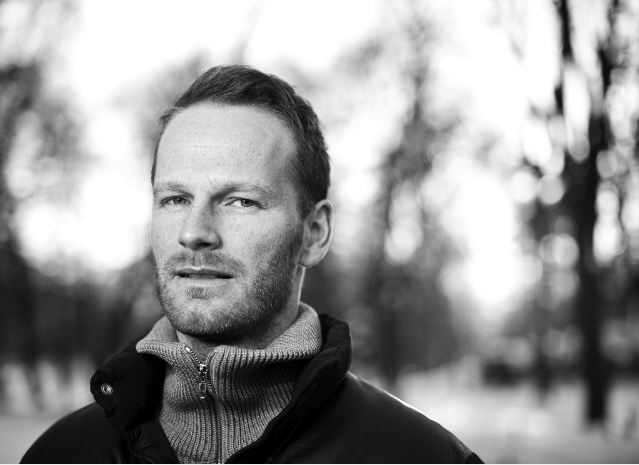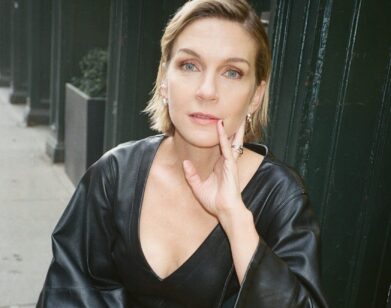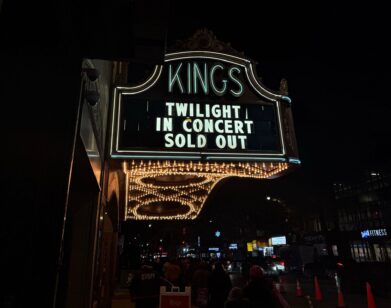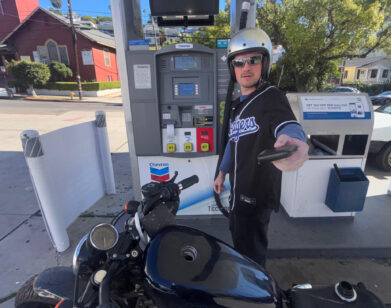Joachim Trier’s City Limits

Oslo, August 31st, the sophomore feature by Norwegian director Joachim Trier, might seem at first to have a slightly deceptive title. While it is indeed set over the course of 24 hours in Oslo, the majority of the film actually takes place the day before—August 30, when rehab patient Anders (played by Anders Danielsen Lie) has been granted a day’s leave from his treatment center in order to go on a job interview. Though he’s outwardly stable—even enviable, with handsome features, cool friends, stylish clothes—Anders is far from cured of his pressing psychological issues: he begins his day by attempting, unsuccessfully, to commit suicide.
From there, Anders’ day takes him all over the city: to visit friends who love him but whose lives have gone on without him, as well as friends who aren’t looking out for his best interests; on that job interview, which goes well until it doesn’t; to cafés filled with the intimate chatter of people he’ll never know; to a party; to a club; and eventually all the way into the next morning, the August 31st of the title. The last 20 minutes make clear that the date in the title is no accident, after all—everything that happens to Anders on August 30, and everything that doesn’t, sets him up for the film’s final turns.
There is a gorgeous melancholy to Oslo, August 31st—an ache that emanates from each meticulously framed shot—but the film balances every moment of despair with tinges of unexpected grace and humor. We spoke to Trier, himself no stranger to being young and hip in Oslo (he was Norway’s National Skateboarding Champion, twice), last week.
ALEXANDRIA SYMONDS: What made you want to adapt Pierre Drieu La Rochelle’s novel, Le feu follet, and how much did it change?
JOACHIM TRIER: I think was a starting point, more than actually ending up being what we adapted. In that novel, there’s a hip, handsome guy who’s part of a sort of bohemian crowd, and he’s just coming out of rehab, and the book is very much about a day in his life where he asks fundamental questions about the choices he’s made so far in his life and tries to find a way forward. I feel that’s sort of a classical, timeless tale. So I put in present-day Oslo, and therefore it’s changed a lot. But there’s still sort of the idea of this character with a very self-destructive integrity in the center of it, someone with high ideals and many choices who feels that he’s sort of wasted his life away a bit, and now tried to come back from a sort of party lifestyle into reality again.
SYMONDS: You co-wrote the film with Eskil Vogt; you two also co-wrote Reprise, and both films star Anders Danielsen Lie. Did it feel like a reunion?
TRIER: I think when we started out, we were kind of worried that it would have similarities. We needed to try something else—[but] after a while, I stopped thinking about it and just concentrated on what we were doing. In a way, it’s a continuation of Reprise. The characters are older, it’s structurally very different; it takes place in a day; it’s more of a character study of one character than this performing chaos of Reprise. But I think thematically, it’s a lot about the darker sides of ambition—that’s a theme that I think both films carry. Also, sort of the difficulty to find your place in the world and to be an outsider on the inside. Oslo, August 31st is about a guy who is seemingly kind of resourceful and popular, but he feels disconnected somehow. Even to the parties and bars that he goes to, there’s sort of disconnectedness, and I think there’s something there that Anders plays very well. I wrote it for him, by the way. I wouldn’t done it without him, I think.
SYMONDS: I couldn’t imagine this role played by anyone else. When you were building the character together, did you feel that there was more of him in the character than is typical with actors?
TRIER: Anders in real life, Anders Danielsen Lie, is kind of a Renaissance man. He’s a doctor, and he’s working as a doctor at the moment. He’s also a musician, he’s released a couple of albums, he’s written a book. He’s done a lot of work. He’s done some journalist work. And he’s an actor. So, I actually sort of triggered his curiosity about this part by saying, “Listen, man, with all your talents, in a dark, alternative universe, it could come to nothing, how would that have felt?” We went from there. And without him having any issues with addiction, I think he went thoroughly into it, he did thorough research, he met old skateboard buddies of mine that I kind of lost touch with that are having drug problems.
We went to clinics, he went undercover into an AA meeting, and ending up being in the middle of it, having to state, honestly, what he was doing there, but promising them that he was trying to make a very nuanced and specific portrait of an addict. Everyone actually became very supportive, and said that this sort of hidden addiction that the film portrays, those stories are seldom told. Usually, [depictions of addiction in film are] very social realist—people that are victims of a bad childhood or something, which are also important stories, but this is something else. He actually got a lot of support from that crowd, believe it or not, in portraying this character.
SYMONDS: When I was watching the film, I kept thinking about a review of an album by the band The National in which the reviewer says they make “music chiefly interested in the complications of being a stable person expected to own certain things and dress certain ways”—the idea that you can be not quite connected with how you’re supposed to feel when you have those things and are in those places.
TRIER: Kind of, I think, this film is an ode to the falling hipster, the fumbling hipster—someone who’s losing control, someone who’s going into a bad spiral but all these options of middle-class life have sort of devastated him, I think. He’s someone who takes care in how he dresses, and he hangs in the right clubs. In Scandinavia, we have all the Swedish fashion and magazines and all the great DJs and all the electro music, and all that is something that I know a lot about. I have friends, and I’ve been in that environment, but it’s also got a bad side, a dark side.
I’m not using that moralistically—I’m more interested in the existential, the themes that come out of such a story, the scene, so to speak. And there’s an ennui, a sort of lostness and disconnectedness that I think is inherently very human. Also, I want to add that I think that cinema is a great place to make stories of loneliness. And being Norwegian, I don’t want to make the film about loneliness in being out in nature on a mountaintop; it’s about being in the cities. It’s the new Norway, it’s a very urban setting. Somehow I hope they all connect with an American audience on that front. I found that with Reprise, a lot of friends I have in New York, for example, were saying, “Oh, you know, it reminds me of my friends in Williamsburg.” And I thought it was quite shocking, because I thought it was local, but Norway has become a very urban culture as well. You know, I’ve been offered a lot of scripts with action movies, with people wrestling with bears out in wherever, and actually, it’s not what I’m into. I’m interested in a completely different scene. So, anyway, that was a long road from your question about The National.
SYMONDS: No, that’s great. That extended sequence at the beginning with young people talking about moving to the city, and some of the lingering shots you take of Oslo—it really feels like a character in the film. How important was the sense of place—would it have been a different story if it had taken place elsewhere?
TRIER: This story could have been put in many places, but I think that this film, and then the way it portrays the city, is inherent to the way that we did our version of the story. I think Oslo is a very changing, growing place at the moment. There’s a lot of interesting things happening in the art and music scene, and in literature. I moved to London in the late ‘90s, when that was really happening, and came back when I was doing Reprise and moved to Oslo. During that process the city changed so much. It’s such a happening scene at the moment. [laughs] So it’s kind of interesting to explore that change, because all the stuff that you knew as a kid has changed and gone and passed. All the areas that I grew up in are inhabited by a lot of rich people. A lot of my friends can’t afford to live there anymore, but Anders is from that kind of cultured, middle-class background. So he’s walking both around the city that’s changing, and he’s also thinking about where he’s from in terms of what he used to be.
SYMONDS: I wanted to ask about the nightclub scene. It’s very easy to do party scenes wrong, or in a way that doesn’t feel organic, but yours is so well-done. Could you talk about your strategies for filming that scene?
TRIER: Yeah. I think basically it’s about choosing the right locations, getting the best extras. I really have a great directing team around me that gathers good faces and cool characters. To be honest, if you going to sit at a bar, and keep people shooting all night, we get some musicians and artists hanging around, they get bored after an hour or two. A lot of the art in that is having a really charming group of directing assistants who can keep the party going and keep people’s energy up… As always, it’s about the perception and the gaze. Where do you look at stuff from? Why do you choose to look at a space from that angle or that angle? Having been enough times half-drunk in one of these bars, I probably discovered some angles from that way, I guess.
SYMONDS: Reprise takes place over a very significant amount of time, and obviously, this film is set over one day. Were there any models for films set over short periods of time that you were looking at as inspiration? Cléo from 5 to 7 came to mind as something that maybe has a similar tone.
TRIER: Thank you, that’s a great compliment. I think certainly, Cléo from 5 to 7. 25th Hour by Spike Lee I think is fascinating, by La notte by Antonioni I think is great. I think there’s also something interesting in, I don’t know, Sixteen Candles, by John Hughes. There’s a lot of films about young people, I think as well. There’s something interesting in discovering what happens when your drama or the events unfold in a day. To start somewhere else, one of the things that really fascinates me about movies is that they make seemingly ordinary moments be filled with some curiosity or some energy or some mystery.
If you have a story like this, you actually have time to sit in a café with a character and listen, and something can happen, and you can go deeply into that moment, while as in Reprise, we were so kind of jumping into different modes and mindsets, and that was fun for us to try out, but this gets deeper into each moment and spends time there.
SYMONDS: With your conception of Anders as a character, I’m interested in what you think about inevitably versus his ability to change his fate. Is there anything that could have happened to him during this day that didn’t, and if it had, things might turn out differently?
TRIER: I think, without spoiling it, it’s a very relevant question. I think what you’re getting at is the essence of what the film is about: to ask those questions about how do we affect each other, how can we actually help each other. How is it when he goes and sees his old best friend, intellectual Thomas, who’s really funny and smart, but to actually say to him, “Listen, all those things we’ve talked about abstractly, it’s sort of happening to me. Where do I go from here?” And for the friend to feel this sort of, “Wow, you can sleep on my couch, but I don’t really know for how long can I really have a guy hanging around my house?” He’s got a family; he’s got kids. I mean, it’s very much about that. How can we really help each other?
It’s also about being alone, and that perspective is—I don’t know, I feel the same listening to a sad song when you have heartbreak, it can kind of be liberating to feel and think those things in the space of a movie or in a sad song. I hope gives perspective, I hope it had some beauty, I don’t want to make a depressing movie. I want it to allow us to ask some questions and stay asking those questions. How predetermined are our lives? It’s something I don’t have the answer to. It’s something I’m pondering upon, and I’m doing it with this movie.
OSLO, AUGUST 31ST OPENS IN LIMITED RELEASE TOMORROW.






